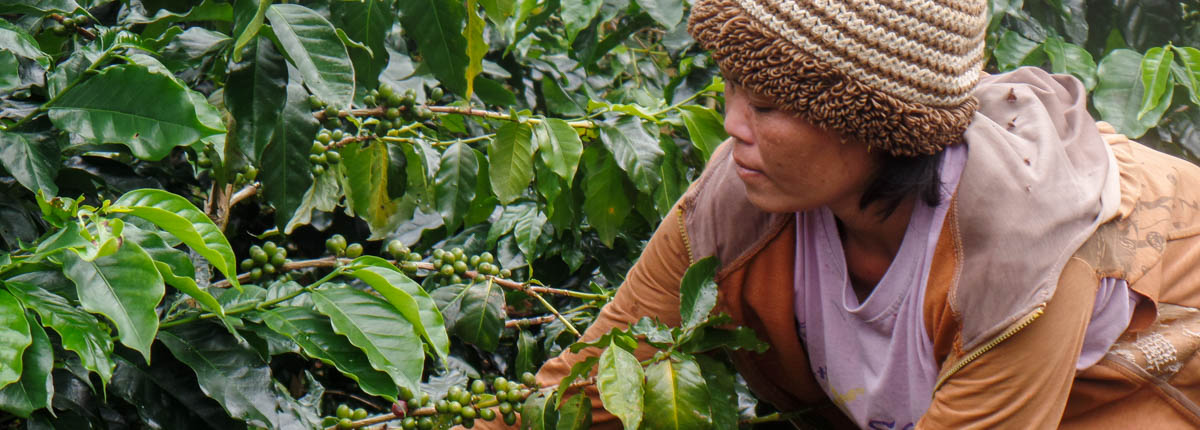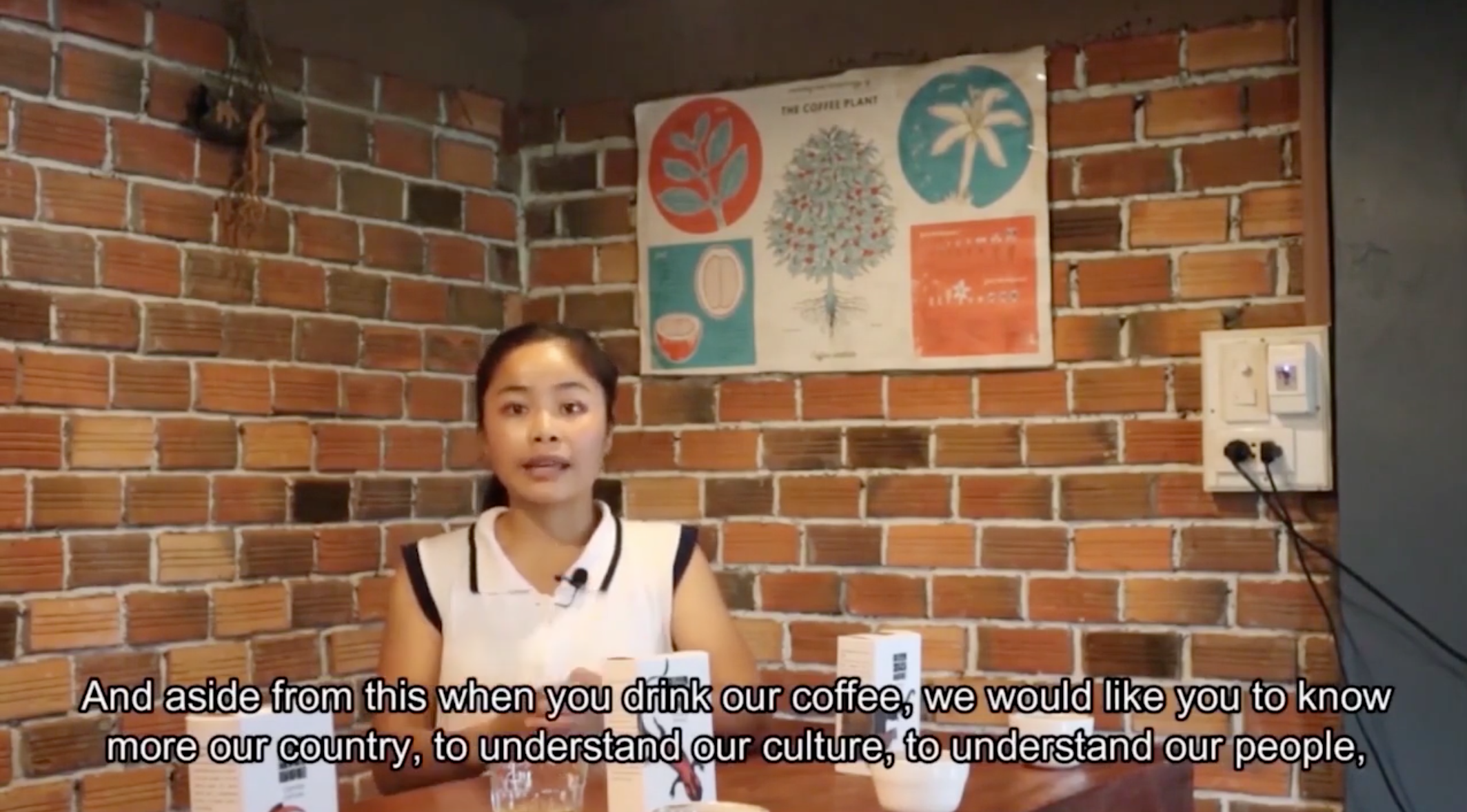
A Taste of Laos
Virtual coffee cupping connects Lao smallholders to high-value U.S. market
By Timothy D. May
Gustatory reactions filled the chat room, fast, and evoked a fruit-laden banquet table at a luxury hotel.
“…A lot of cranberry…orange blossom, very plummy…really great raspberry, jackfruit…strawberry cream yeah! …honey-orchard-oolong-melon-almond-sugar cookie…dark chocolate notes…nice sweet vanilla…lower tones of nuts, nuttiness…”
Tim Heinze, a specialty coffee expert and trader for a multinational coffee company who ordinarily lives and works in Papua New Guinea, captured and read aloud, almost in real-time, his online audience members’ visceral responses to the coffees they were tasting. Standing aproned and alone in the dining room of his in-laws’ house in Dallas, he nodded and agreed with the overwhelmingly positive and mostly fruity assessments scrolling down his screen, often excitedly adding his own rapid-fire sensory impressions.
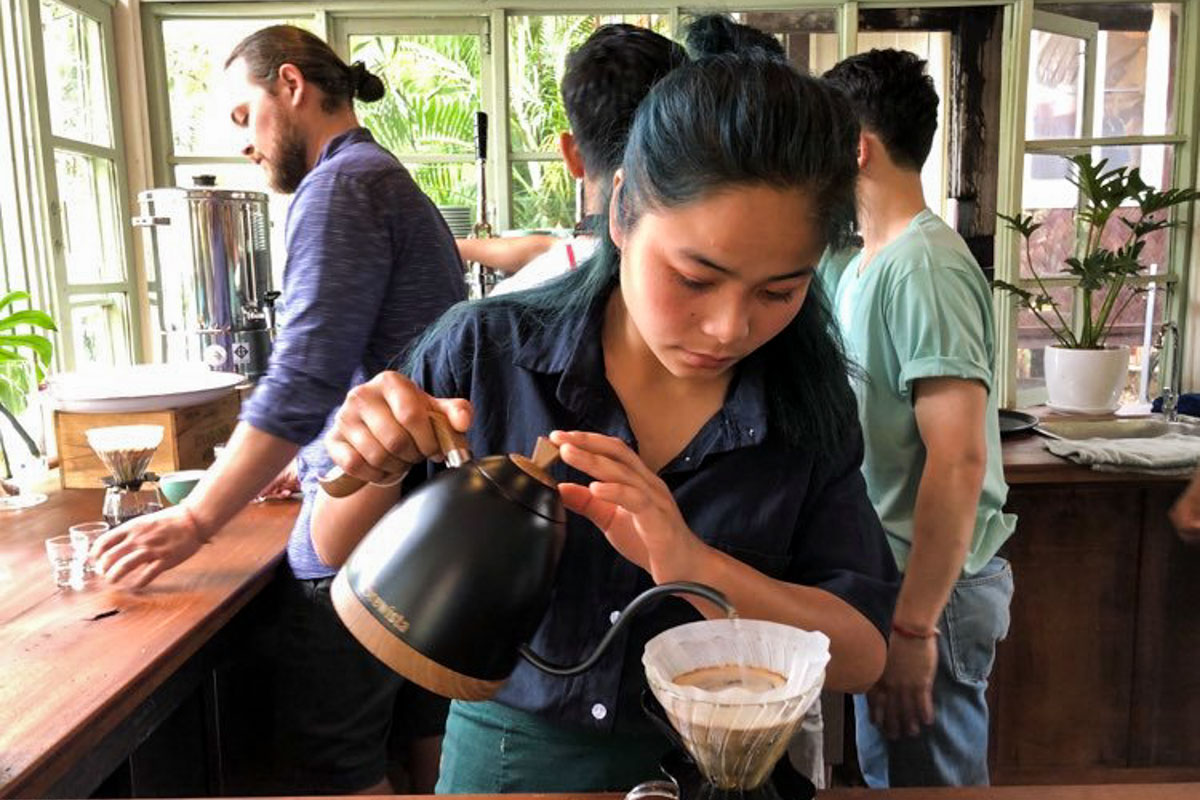
Most of the 50-plus participants in the first-ever virtual coffee cupping organized by the Coffee Quality Institute in partnership with USDA’s Creating Linkages for Expanded Agriculture Networks (CLEAN) project, implemented by Winrock, were tasting samples of select, carefully roasted coffees from Laos for the first time. The target audience, safely distanced by thousands of miles but tethered via live webinar, included two-dozen U.S.-based specialty coffee roasters, café owners and buyers, each of whom is an influential industry leader committed to equitable, transparent and direct trade with farmers. Heavy hitters in the group included a buyer for the Colorado-based company that supplies most of the exotic specialty coffees sold in Whole Foods Markets and the chief product officer of the leading organic cold-brewed coffee company in the U.S., now owned by Nestlé USA.
The invisible tasters, who logged on from California, Texas, Oregon, Washington, Massachusetts, Vermont, Ohio, Maryland and other states, had previously received FedEx boxes containing 50-gram packets of Lao coffee beans collected by the CLEAN project in Laos from three coffee cooperatives: Bolaven Farms, Jing Jhai and the Bolaven Plateau Coffee Producers Cooperative. Observers and others tuned in from locations as far away as Indonesia, with CLEAN’s Chief of Party, Alex Dahan, connecting from temporary COVID-19 exile in Ireland. A USDA Foreign Agricultural Service representative participated from Washington, D.C., and farmers and co-op leaders joined from southern Laos. The FedEx packages included a 16-page booklet describing the CLEAN project and its market linkage goals; the history and composition of the coffee co-ops; and details of the samples including cultivars, farm elevations, and facts about the farmers and their growing and processing practices.
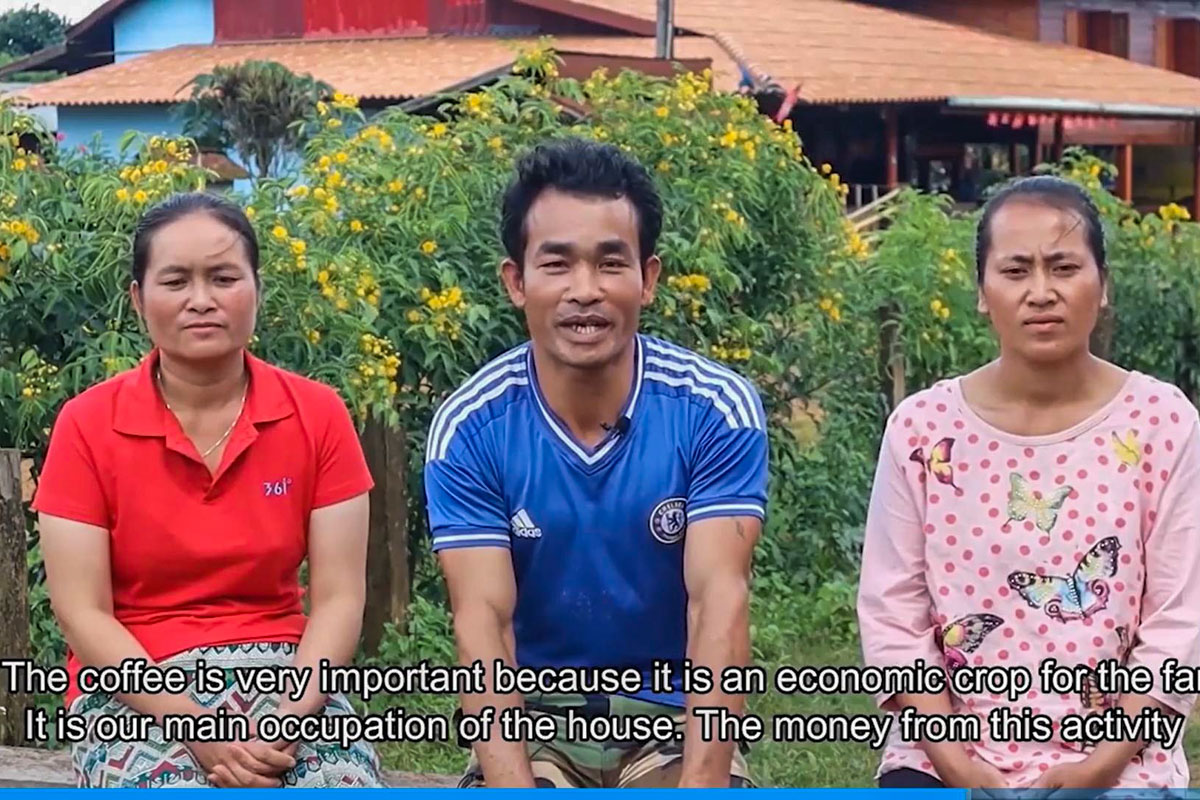
A strong score from any of the influential sniffers and sippers in the online group could go a long way toward helping coffee in Laos — a small, landlocked nation squeezed between the larger, better-known coffee-producing countries of Thailand and Vietnam — get noticed, or even help seal new export deals. The U.S. coffee market is, after all, the world’s largest, with imports totaling more than $4 billion per year and rising. Why shouldn’t Lao coffee farmers benefit, if they have good coffee? (To qualify as specialty and earn quality premiums, coffee must win a score of between 80 to 100 points on the Specialty Coffee Association scale; coffees considered very good and highly commercially valuable are scored at 85 or higher.)
The problem, especially in an era of contagion-induced travel restrictions, is getting Laos’ unknown coffees into the cups and under the noses of prospective new buyers to score them. Ordinarily, elite specialty coffee buyers, particularly those interested in sourcing single-origin beans, like to travel to the source to assess new coffees, experience the terroir, and get to know the producers. CLEAN and CQI pitched the virtual cupping idea as an adaptive COVID-19 workaround, and quickly drew strong interest from U.S.-based roasters and buyers; Lao farmers and co-op leaders also jumped on board.
“Today, America gives us the opportunity to be one of them, and select to taste the coffee from our country and let other people of the world know that Lao people have specialty coffee.”
The Lao coffee samples presented at the July 2020 virtual event, officially titled “A Taste of Laos,” were first slated to debut in April 2020 at the global specialty coffee industry’s most important annual trade show: the Specialty Coffee Association Expo, which was to have been held in Portland, Oregon. With financial support from USDA, a number of Lao coffee farmers were set to travel to the expo to participate in a cupping of coffees pre-screened by CQI, to stir interest amongst the glitterati of the specialty coffee industry. Like countless other important events, the expo became yet another COVID-19 trade casualty.
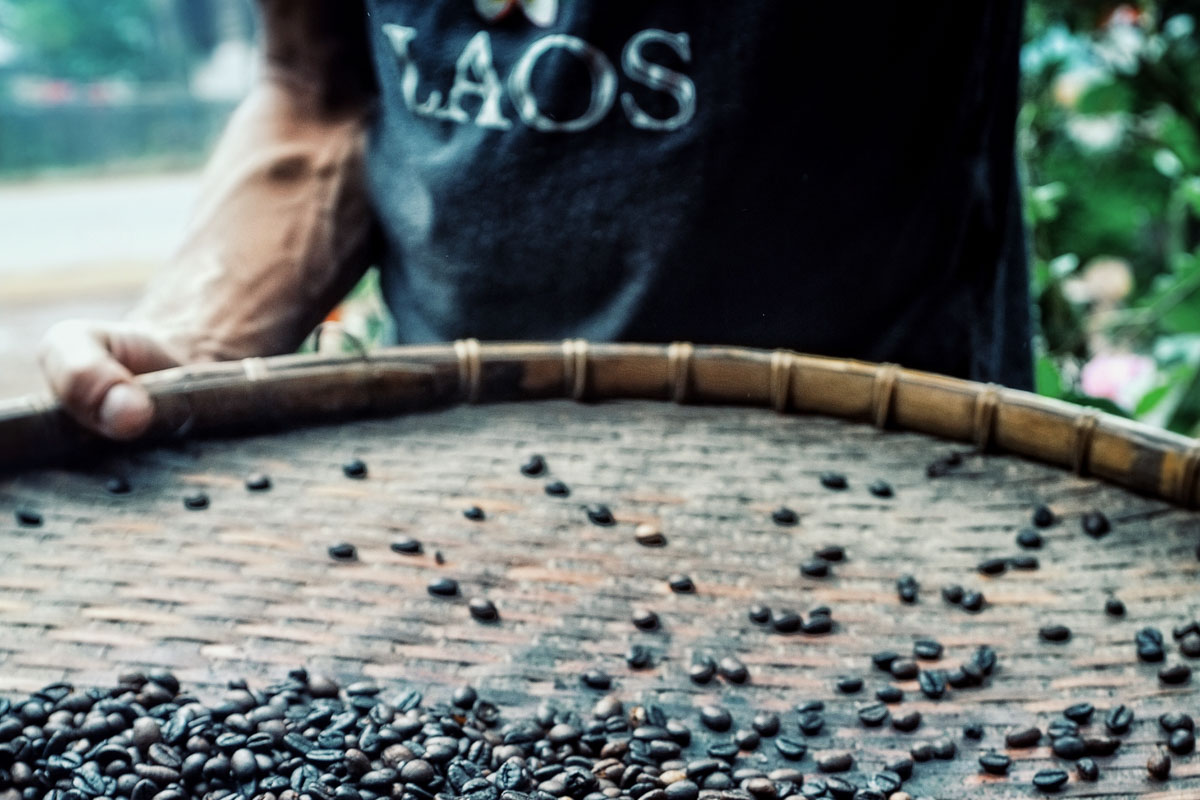
In his opening remarks for the virtual event, CLEAN’s COP, Alex Dahan, emphasized the project’s goal of “connecting farmers in remote areas of Laos to potential new regional and global markets. Our farmers are crucially in need of new export opportunities, and I hope we can count you among those, in the near future.” He added: “We are thrilled to be working once again with CQI, with whom Winrock worked in Myanmar for nearly five years on a successful USAID project, with stunning results. We are working together again with some great local coffee farmers in Laos to bring you some very special coffees today.”
In the run-up to the cupping, CLEAN scrambled to record interviews with eight Lao coffee farmers and co-op members, as well as from a supportive leader in the Lao Department of Agriculture, a key project partner. Interspersed between tasting and discussing the attributes of each sample (curated by Heinze), the videos enabled cuppers to hear directly from growers about cultivation practices and problems, as well as their hopes for the future. All of them expressed feelings of pride in their coffees’ selection for the event.
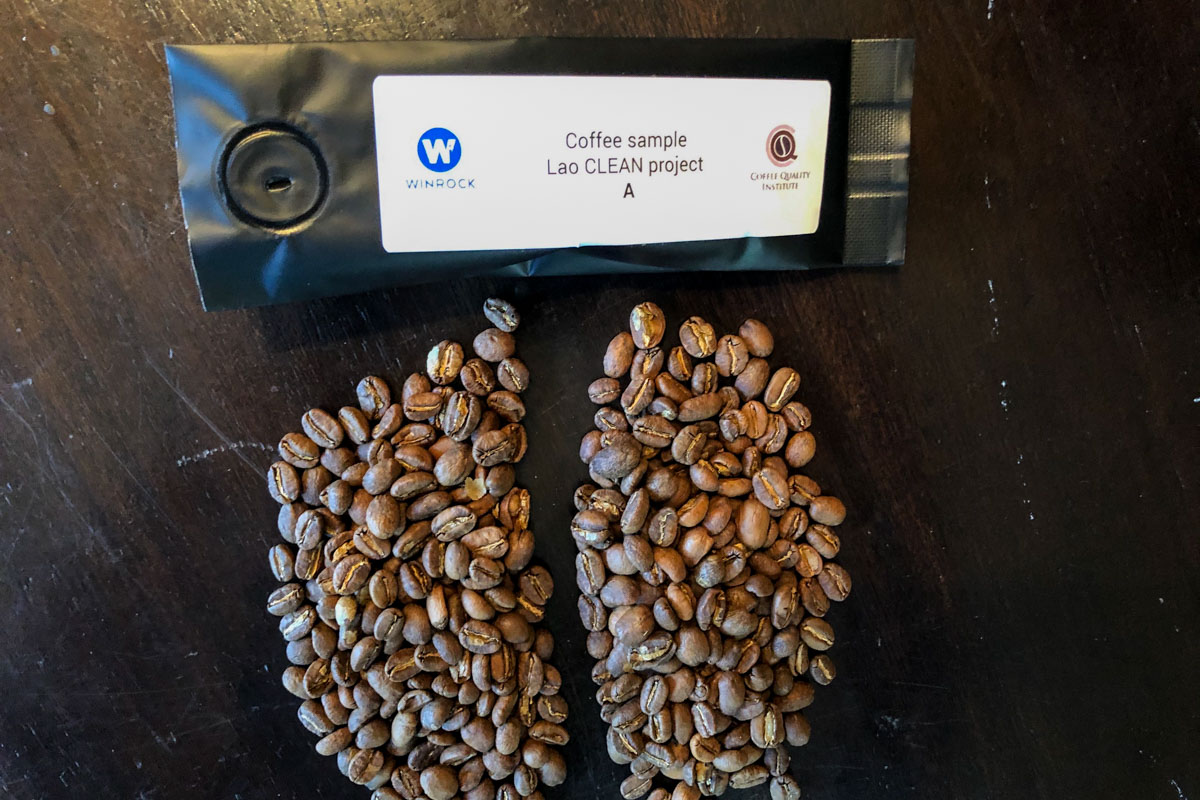
“Coffee is the main crop, the main income for the villagers,” said Laty Keopiensy, a co-founder of the Jing Jhai Coffee, in a pre-recorded video from Jing Jhai’s cozy café in downtown Paksong, a bustling town on the Bolaven Plateau. The Jing Jhai café and roastery invests all of its profits into children’s sanitary education and clean water projects in the Lao coffee-growing communities where it works. “When Winrock told us that OK, the SCA (Specialty Coffee Association) wants to taste your coffee, that day we were, like, ‘Whoa! The SCA will take our coffee to taste!’ Today, America gives us the opportunity to be one of them and select to taste the coffee from our country and let other people of the world know that Lao people have specialty coffee.”
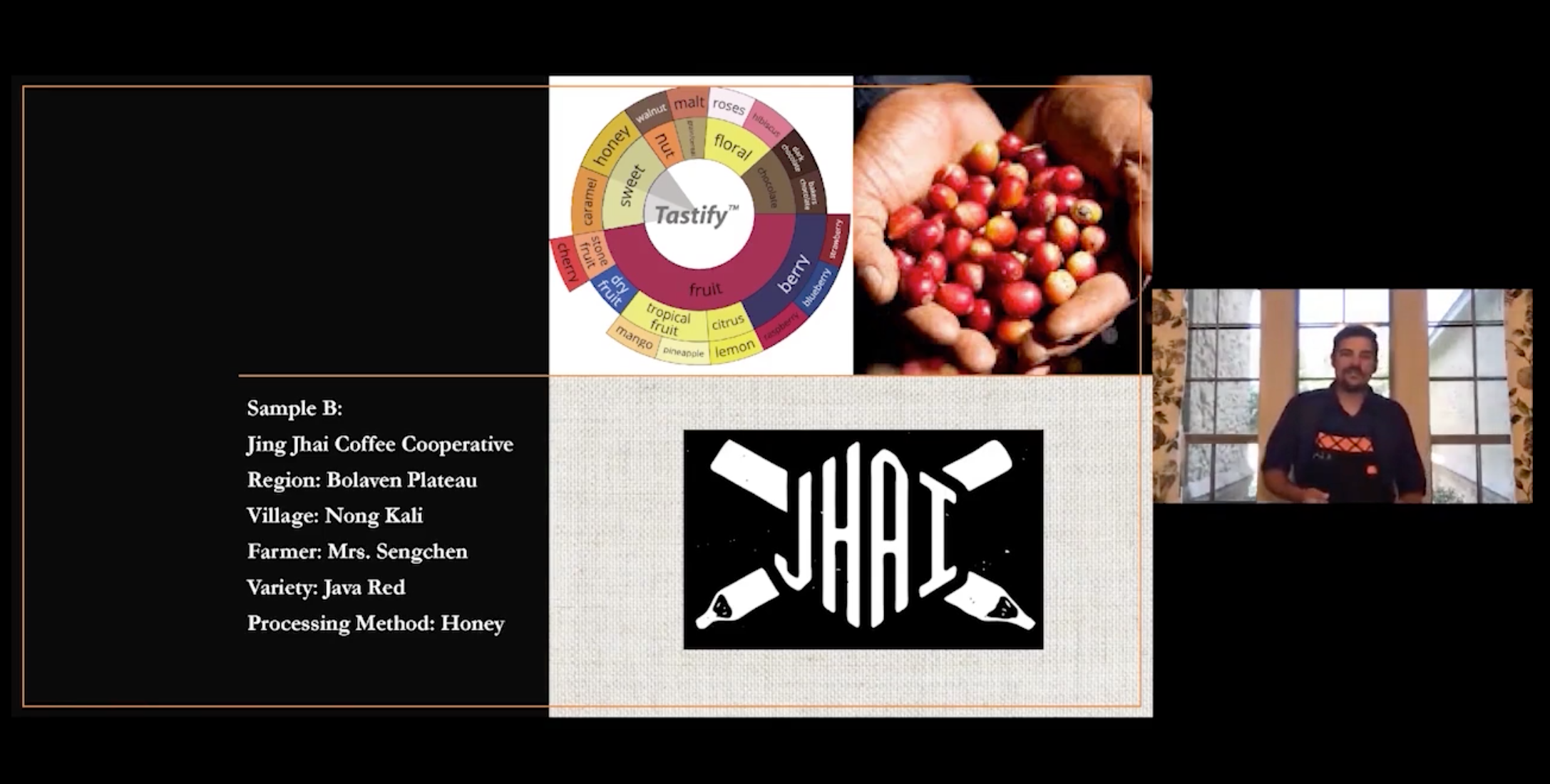
In the end, most of the participating roasters and buyers said the interesting, fruity flavors and overall quality of the coffees prompted them to consider adding Lao Arabica to their offerings; several posed logistics and other practical questions about how to find and import the coffees, which CLEAN and CQI will address with producers. They encouraged CLEAN and its partner co-ops to keep the momentum and enthusiasm going by organizing an annual, nationwide cupping competition and inviting buyers out to their farms, in person (post-pandemic).

Jay Caragay, a roaster and café owner in Baltimore, was so inspired and intrigued by the Lao coffees that he decided to recreate the virtual cupping independently on YouTube, for fans of his acclaimed Spro Coffee cafés (see the Spro YouTube cupping here).
Though he liked each of the samples and rated them all highly, one sample knocked him out. “It has a savoriness to it that makes it really unique,” he said of Sample C, the beans submitted by Bolaven Plateau Coffee Producers Cooperative, after slurping it contemplatively at least a half-dozen times at various temperatures. “It’s something new. I would be interested in getting that for the shop, that would be kinda cool … I’ll have to reach out to these guys and see if I can actually get that.”
Virtual mission accomplished.
To view a recording of the event, click here.
Timothy D. May is Senior Content Manager at Winrock International.
Related Projects
